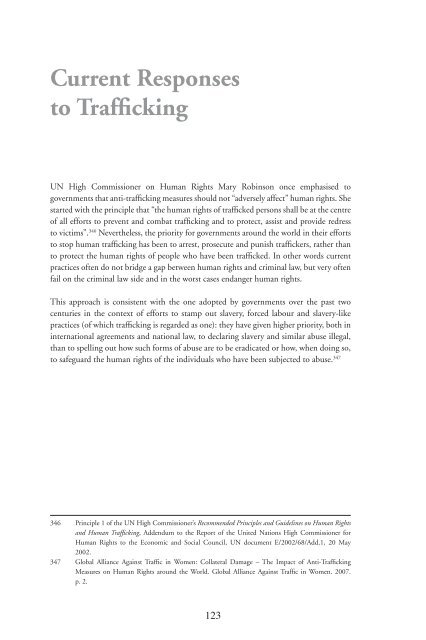Trafficking in human beings: human rights and ... - unesdoc - Unesco
Trafficking in human beings: human rights and ... - unesdoc - Unesco
Trafficking in human beings: human rights and ... - unesdoc - Unesco
You also want an ePaper? Increase the reach of your titles
YUMPU automatically turns print PDFs into web optimized ePapers that Google loves.
Current Responses<br />
to Traffi ck<strong>in</strong>g<br />
UN High Commissioner on Human Rights Mary Rob<strong>in</strong>son once emphasised to<br />
governments that anti-traffi ck<strong>in</strong>g measures should not “adversely affect” <strong>human</strong> <strong>rights</strong>. She<br />
started with the pr<strong>in</strong>ciple that “the <strong>human</strong> <strong>rights</strong> of traffi cked persons shall be at the centre<br />
of all efforts to prevent <strong>and</strong> combat traffi ck<strong>in</strong>g <strong>and</strong> to protect, assist <strong>and</strong> provide redress<br />
to victims”. 346 Nevertheless, the priority for governments around the world <strong>in</strong> their efforts<br />
to stop <strong>human</strong> traffi ck<strong>in</strong>g has been to arrest, prosecute <strong>and</strong> punish traffi ckers, rather than<br />
to protect the <strong>human</strong> <strong>rights</strong> of people who have been traffi cked. In other words current<br />
practices often do not bridge a gap between <strong>human</strong> <strong>rights</strong> <strong>and</strong> crim<strong>in</strong>al law, but very often<br />
fail on the crim<strong>in</strong>al law side <strong>and</strong> <strong>in</strong> the worst cases endanger <strong>human</strong> <strong>rights</strong>.<br />
This approach is consistent with the one adopted by governments over the past two<br />
centuries <strong>in</strong> the context of efforts to stamp out slavery, forced labour <strong>and</strong> slavery-like<br />
practices (of which traffi ck<strong>in</strong>g is regarded as one): they have given higher priority, both <strong>in</strong><br />
<strong>in</strong>ternational agreements <strong>and</strong> national law, to declar<strong>in</strong>g slavery <strong>and</strong> similar abuse illegal,<br />
than to spell<strong>in</strong>g out how such forms of abuse are to be eradicated or how, when do<strong>in</strong>g so,<br />
to safeguard the <strong>human</strong> <strong>rights</strong> of the <strong>in</strong>dividuals who have been subjected to abuse. 347<br />
346 Pr<strong>in</strong>ciple 1 of the UN High Commissioner’s Recommended Pr<strong>in</strong>ciples <strong>and</strong> Guidel<strong>in</strong>es on Human Rights<br />
<strong>and</strong> Human Traffi ck<strong>in</strong>g, Addendum to the Report of the United Nations High Commissioner for<br />
Human Rights to the Economic <strong>and</strong> Social Council, UN document E/2002/68/Add.1, 20 May<br />
2002.<br />
347 Global Alliance Aga<strong>in</strong>st Traffi c <strong>in</strong> Women: Collateral Damage – The Impact of Anti-Traffi ck<strong>in</strong>g<br />
Measures on Human Rights around the World. Global Alliance Aga<strong>in</strong>st Traffi c <strong>in</strong> Women. 2007.<br />
p. 2.<br />
123

















